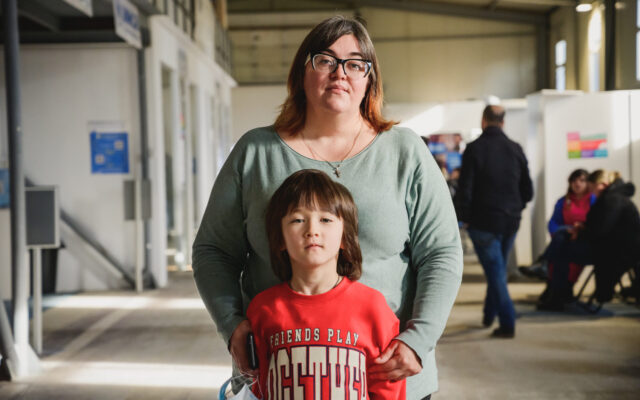Answering calls for help from Ukrainian refugees
UNHCR’s helpline in Moldova answers calls from vulnerable Ukrainian refugees and connects them with the right support.
14.02.25
It is a cold grey Tuesday in Moldova’s capital, Chisinau. Across the border in neighbouring Ukraine, missile strikes, prolonged power outages, lack of heating and worsening conditions caused by the ongoing full-scale Russian invasion mean refugees are simply unable to return home. Newly displaced refugees continue to arrive.
View this post on Instagram
As a Ukrainian refugee herself, helpline operator Aliona knows first-hand the difficulties these families face – especially when temperatures plummet.
“There’s a vast range of reasons that people call the helpline,” she says. “Some need help with food, housing or legal issues they can’t manage on their own.
“With the arrival of winter, many are seeking shelter in warm refugee centres. And those who are renting their own place often ask if there’s extra support to help cover the cost of rent, utilities and winter clothing. Many arrived with only hand luggage and don’t have anything warm.”
For new arrivals as well as those who have been displaced for longer, UNHCR’s helpline – known as the Green Line – is a vital point of contact, connecting them up to local partners and services that can provide the right support. That might mean refugee accommodation centres, or community hubs that distribute winter essentials. In other cases, it might mean the General Inspectorate for Migration, or a host of other legal aid services.
With Moldova now hosting over 100,000 Ukrainian refugees, the demand for help has never been higher and the phones at the helpline are always ringing. In the first ten months of 2024, the team answered over 40,000 calls for help – around a thousand a week, even before the worst of the winter weather.
Yet for Aliona, the busy shifts are all worth it. She’s proud to be working alongside other Ukrainians and local Moldovans at the helpline, such as Maria, and making a real difference to refugees’ lives.

The helpline is staffed by a team of Ukrainian refugees like Aliona (left) and local Moldovans like Maria (right) working together. © UNHCR/Mark Macdonald
“We help each other because we understand this crisis situation,” explains Maria about why the helpline is important. “These people need help. We are neighbours and so we are very close.”
Before the war, Aliona managed an apartment building in the Ukrainian coastal town of Odesa. But when the invasion began, she and her husband decided to flee to safety – taking with them their two grandchildren and just a handful of belongings.
“My plan was to just to go for a week, so I packed absolutely no luggage. I was wearing only light clothing, even though it was March,” she remembers. “The first three days after our arrival, we were in a state of shock. We couldn’t comprehend what was happening and constantly watched the news to kept track of the situation. But after about a week, I started looking for ways I could be useful and do something to help people – wherever help was needed.”
For a while, Aliona volunteered at an emergency refugee reception centre – doing translation work, cleaning, helping families find accommodation and providing whatever support she could. But when she heard about UNHCR’s helpline, she was keen to get involved and soon became part of the team.
“This work is very important to me because I believe if you help others, you’ll get help yourself,” she explains. Although the work is tiring and the stories she hears distressing, she remains optimistic about the future – saying, “I hope that by spring next year we will see the end of the war and people will be able to return home to Ukraine.”
To find out more about the situation in Ukraine and how donations are helping to fund projects such as the Green Line, visit our website here.




